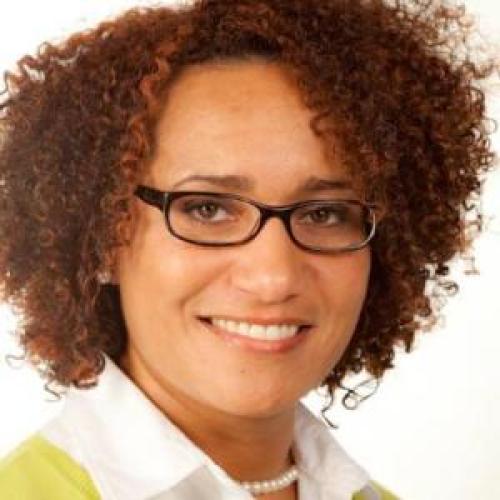Doctor of Philosophy (Ph.D.)
Public Policy, American Politics & Public Administration
University of Georgia
2004

Keesha M. Middlemass, Ph.D., is an Associate Professor in the Department of Political Science at Howard University. Dr. Middlemass teaches graduate and undergraduate courses in public policy and American Politics, studies the intersection of race, public policy, and marginalized populations, and uses mixed methods, such as ethnography, interviews, focus groups, and archival research to support her research agenda. Dr. Middlemass focuses specifically on questions about the politics of punishment, racial justice, and the lived experiences of formerly incarcerated adults. Her award-winning book, Convicted & Condemned: The Politics and Policies of Prisoner Reentry (NYU Press, 2017), is an interdisciplinary and multi-layered examination of prisoner reentry. The in-depth analysis demonstrates that public policies create perverted incentives for men and women convicted of a felony and who are attempting to reenter society. Currently, Dr. Middlemass is studying food insecurity in the returning prison population and is the lead Principal Investigator of a Knight Foundation funded research initiative. This interdisciplinary project explores the intersection of race and misinformation on social media.
Dr. Middlemass’ peer-reviewed work has been published in The Prison Journal, Punishment & Society, Public Health Nutrition, International Journal of Eating Disorders, Aggressive Behavior, Criminal Justice & Behavior, and she has published several chapters in numerous books. Dr. Middlemass is a member of the Racial Democracy, Crime and Justice Network (RDCJN), a former Andrew Mellon Post-Doctoral Fellow on Race, Crime and Justice at the Vera Institute of Justice in New York City, a former American Political Science Association Congressional Fellow, and is currently a Brookings Fellow.
Dr. Middlemass holds a M.A. (American Politics) and Ph.D. (Public Policy, American Politics & Public Administration) from The School of Public & International Affairs at the University of Georgia.
Public Policy, American Politics & Public Administration
University of Georgia
2004
American Politics
University of Georgia
1998
Political Science
Wichita State University
2021. $75,000 The Wilson Foundation Convening Grant for Reentry Ready Project in New Orleans, Louisiana, partnered with Consensus Building Institute & Convergence.
2020. $250,000 Knight Foundation Grant, Lead Principal Investigator: “Black and Urban Digital Protections and Democratic Knowledges in Washington, D.C.” with Roger Caruth, Brandon Hogan, Kim Michelle Lewis, Bahiyyah Muhammad
2017. $3,000 Murchison Summer Research Institute, Food Matters Lab, with undergraduate students Calista Struby, Eden White, and Paula Guiterrez, Trinity University.
Read: WHEC | Married women face hurdles obtaining REAL ID due to original document rule
Read: WSOC-TV | For families with sick kids, the rise of vaccine hesitancy could be life-threatening
Watch: Trump’s defiance in the face of federal charges
Read: Vanguard News | CONVICTED FELON IN WHITE HOUSE MEANS CLEAN SLATE LAWS JOIN POLITICAL DISCOURSE
Read: The Providence Journal | Inside Story: Keesha Middlemass, Howard University expert on incarceration
Read: Bulletin of the Atomic Scientists | A team of Howard University researchers wants to know how disinformation impacts Black people
Watch: PBS NewsHour | The barriers to reentering society after prison
Prisoner Reentry in the 21st Century: Critical Perspectives of Returning Home
This groundbreaking edited volume evaluates prisoner reentry using a critical approach to demonstrate how the many issues surrounding reentry do not merely intersect but are in fact reinforcing and interdependent. The number of former incarcerated persons with a felony conviction living in the United States has grown significantly in the last decade, reaching into the millions. When men and women are released from prison, their journey encompasses a range of challenges that are unique to each individual, including physical and mental illnesses, substance abuse, gender identity, complicated family dynamics, the denial of rights, and the inability to voice their experiences about returning home.
Misinformation is eroding the public’s confidence in democracy
Convicted and Condemned: The Politics and Policies of Prisoner Reentry
Convicted and Condemned explores the issue of prisoner reentry from the felons’ perspective. It features the voices of formerly incarcerated felons as they attempt to reconnect with family, learn how to acclimate to society, try to secure housing, find a job, and complete a host of other important goals. By examining national housing, education and employment policies implemented at the state and local levels, Keesha Middlemass shows how the law challenges and undermines prisoner reentry and creates second-class citizens.
Child Support Enforcement, Poverty & the Creation of New Debtor’s Prison
This article traces the development of the child support enforcement systems through legislative, administrative, and judicial decisions, and, alongside empirical studies, examines how public policies purportedly enacted for the benefit of children living in economically fragile families have harmful consequences.
With less than 5 percent of the planet’s population, the United States houses 22 percent of the world’s prisoners. The challenges of navigating that system don’t end when the convicted felon completes his or her sentence. Keesha Middlemass shines a light on the substantial barriers felons face when they try to reenter society.
Every year, more than 600,000 people leave state and federal prisons in the United States and millions more cycle in and out of jails. Many of those individuals find that even though they have served their time, they still are not free, often facing barriers to housing, food, employment and more. PBS NewsHour’s Nicole Ellis hosts a panel focusing on making reentry work.
Howard University professor Keesha Middlemass says the idea of domestic terrorism needs to be attached to these rioters.